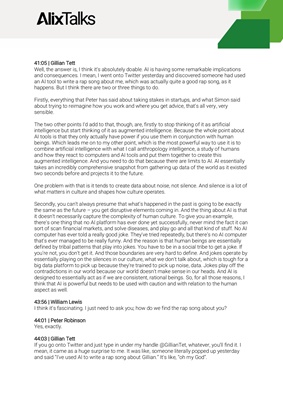
43:00 | William Lewis
But given just to drive along, given that the consensus of this group appears to be the
sanctions are not going away anytime soon and most likely are going to deepen and lengthen.
How sustainable in the West are the sanctions going to be when they do begin to make a
material impact to people's cost of living over and above what's already begun to happen?
How sustainable do we think they are, or is it something that the West can only keep going for
a short while?
43:37 | Guy Harrison
I think you're right to raise the question, Will, and I think also there may well be some fatigue
that sets in in terms of people's attention span and their sympathy with the Ukrainian
situation, particularly as the so called 'cost of living crisis' starts to bite. I think, again, coming
back to your very first point around this being unprecedented, there isn't necessarily a model
that we've seen that we can replay over this scenario. I think, however, if we do start to see
more human rights abuses and discoveries of war crimes, throughout Ukraine, and those are
broadly publicized and well evidenced, I think, again, public opinion will sustain these sorts of
sanctions for quite some time yet.
44:32 | William Lewis
Ok, all right. Well, now let's throw it forward if we can, because clearly our audience is very
keen for us, for each of you to address the issue of what's likely to happen next. We touched
on some of the issues with gas, for example, but how far do we think individual sanctions will
go? Will it begin to include non-Russian businesspeople who have done business in the former
Soviet Union years back? Could sanctions extend to advisors, to oligarchs and investors in
Russian business? How should people begin to think about the next gears that governments
could go through?
45:20 | Wendy Wysong
I mean, obviously, we've got the industry sectors that they're going to continue to tweak and
worry with. But I do think that with the withdrawal of law firms and accounting firms that have
left Russia, the concern about the attention that's been paid as to the role that they played in
advising the oligarchs as to how to set up these complicated ownership structures that are
non-transparent. They're being named and shamed. And so public opinion is being shaped by
their role.
So, whether or not they actually get sanctioned, it's more difficult. I'm allowed to give advice
on how to comply with sanctions, I'm not allowed to give advice on how to evade sanctions
and how to structure your business to evade sanctions, that kind of thing. Because the OFAC
and the U.S. regulators want us to give advice in compliance and they want us to help
companies. I spend a good amount of time, getting to your point Tom, working with
companies that are put on these lists, rightly or wrongly, and trying to find the proof and the
basis for those listings, and if there is no proof, no basis, helping those companies get off
those lists. And that's a proper role for the lawyers and advisors to fulfil and something to be
encouraged.
The other is something that they're going to shine a light on, they're going to look into who's
been enabling and facilitating some of those actions. The U.S. has said that right now they're
not looking at secondary sanctions because there's just so much animosity towards
secondary sanctions where there's no U.S. Nexus. But it is something that the U.S. sort of